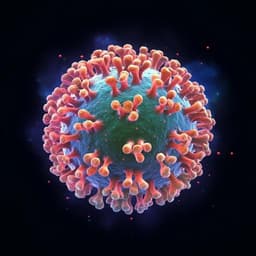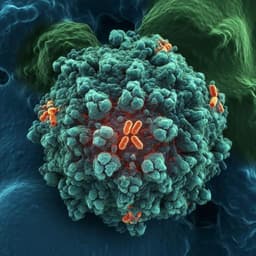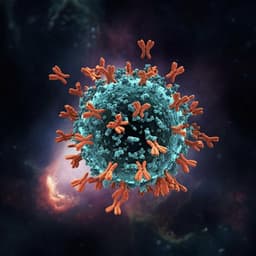
Medicine and Health
Sterile protection against relapsing malaria with a single-shot vaccine
E. M. Pasini, A. V. V. D. Wel, et al.
Malaria remains a major global health concern, with a growing proportional burden from Plasmodium vivax in the Asia-Pacific region. While high protection against P. falciparum has been achieved using live sporozoites administered under chemoprophylaxis (CPS), thereby preventing blood-stage disease and focusing immunity on liver stages, this strategy has not been fully explored for relapsing malaria. The study addresses whether a single high-dose live sporozoite vaccination that leverages natural relapses (from hypnozoites) can self-boost liver-stage immunity and provide sterile protection against homologous sporozoite challenge. The approach may offer substantial logistical advantages over multi-dose regimens and could inform vaccine development for relapsing malarias such as P. vivax.
- Prior CPS studies in humans with P. falciparum demonstrated high-level protection by exposing volunteers multiple times to low numbers of infectious sporozoites under continuous chloroquine coverage, preventing blood-stage infection and pathology while inducing liver-stage immunity.
- Limited data exist for P. vivax liver-stage immunity; earlier nonhuman primate studies showed partial protection (around 50%) after repeated exposures and suggest complex roles for blood-stage exposure on immunity.
- A prevailing hypothesis from P. falciparum CPS work is that avoiding blood-stage infection is beneficial to focus immune responses on liver stages. The current work evaluates whether, for relapsing malaria, limited blood-stage exposure may instead enhance protection via self-boosting relapses.
- The discussion references evidence of cross-strain protection in humans with P. falciparum sporozoite vaccines and conceptual possibilities for cross-species immunity, along with prospects for genetically attenuated parasites (GAPs) and adjuvants to improve immunogenicity and practicality.
Design: Proof-of-concept study in a nonhuman primate model of relapsing malaria using Plasmodium cynomolgi in rhesus macaques. Three groups (n=4 per group; total N=12) were used: (1) hypnoboost-CPS (continuous chloroquine coverage to prevent blood-stage exposure), (2) hypnoboost-BS (limited blood-stage exposure allowed during primary infection and each relapse before chloroquine treatment), and (3) mock-vaccinated controls.
Vaccination: A single intravenous dose of 1×10^6 freshly isolated P. cynomolgi M-strain sporozoites was administered to the two vaccinated groups at day 0.
Blood-stage management and relapse monitoring:
- Hypnoboost-CPS: continuous chloroquine (CQ) coverage established via weekly injections to abort blood stages throughout the immunization phase, preventing detection of parasitemia on thin smears.
- Hypnoboost-BS: primary parasitemia and subsequent relapses were allowed for at least four days each before initiating 5-day CQ treatment, permitting limited blood-stage exposure. Primary parasitemia occurred between days 7–11 post-vaccination, and three relapses were observed by day 101.
- The unique immunization phase ended after the last animal in hypnoboost-BS showed its third relapse.
Radical cure and challenge: Once three relapses were documented in the hypnoboost-BS group, all 12 animals (including controls) received radical cure with primaquine (PQ) plus chloroquine for seven days to clear developing and dormant liver stages as well as any blood stages. After a 15-day drug washout, all animals were challenged intravenously with 200 freshly isolated P. cynomolgi sporozoites.
Monitoring of infection: From day 8 post-challenge, all animals were monitored daily for parasitemia by thin blood smears. Smears were Giemsa-stained, at least 20,000 RBCs were evaluated per time point, and readings were performed by multiple blinded staff to determine day-to-patency. Relapse positivity was defined as parasitemia evident on two consecutive days.
Immune assays:
- Antibody detection by ELISA against selected blood-stage antigens (AMA1, MSP1, RON4, RON5, HSP70, EXP1) and by immunofluorescence on infected blood smears.
- Peripheral immune cell phenotyping by spectral flow cytometry on cryopreserved PBMC at baseline and 18 weeks later (pre-challenge) to quantify T cell subsets (CD4+, CD8+, γδ T cells), antigen-presenting cells (HLA class II+ classical and intermediate monocytes, dendritic cells), innate lymphocytes/NK cells, and B cells (CD20+ HLA-DR+). Analyses were performed on an Aurora spectral cytometer; FlowJo 10.8 was used for gating/analysis.
Statistics:
- Primary outcome: sterile protection (absence of patent parasitemia post-challenge) and time-to-patency comparisons between groups using log-rank (survival) tests.
- Planned sample size/power considerations described; Fisher’s exact test considered for primary analysis comparing control vs treatment.
Ethics: All procedures approved by the relevant ethical committee (DEC 751B) and conducted in accordance with Dutch and European regulations; animals were captive-bred male Indian rhesus macaques (6–15 years), socially housed, with enrichment and veterinary oversight. Procedures were performed under anesthesia with appropriate analgesia.
- Protection outcomes after homologous sporozoite challenge (200 sporozoites):
- Hypnoboost-BS group (limited blood-stage exposure): 3/4 monkeys achieved sterile protection (75%).
- Hypnoboost-CPS group (continuous chloroquine, no blood-stage exposure): 1/4 monkeys achieved sterile protection (25%).
- Control group: all became patent; no sterile protection.
- Time-to-patency analysis showed a statistically significant difference between control and hypnoboost-BS groups (log-rank p = 0.006). Figure 2 indicated overall 4/8 vaccinated animals were sterilely protected.
- Relapse dynamics (hypnoboost-BS): primary parasitemia between days 7–11 post-vaccination; three relapses observed by day 101; each episode allowed at least four days of blood-stage parasitemia before CQ treatment.
- Humoral responses to blood-stage antigens: no detectable antibodies by ELISA (AMA1, MSP1, RON4, RON5, HSP70, EXP1) or by IFA, despite limited blood-stage exposure.
- Immune cell profiling: no notable shifts in frequencies of major T cell subsets, APCs, or innate lymphocyte/NK cells between baseline and pre-challenge across groups, except a trend toward increased B-cell frequencies in the hypnoboost-BS group (Wilcoxon/Mann-Whitney testing as per Fig. 3), acknowledging limited statistical power.
- Overall, data suggest that limited blood-stage exposure during the self-boosting phase may augment protection relative to continuous chemoprophylaxis without blood-stage exposure in this relapsing malaria model.
The study demonstrates that a single high-dose live sporozoite vaccination that leverages natural hypnozoite relapses (self-boosting) can induce sterile protection against homologous sporozoite challenge in a relapsing malaria model, with higher efficacy observed when limited blood-stage exposure is allowed before chemotherapeutic clearance. These findings challenge the prevailing CPS paradigm from P. falciparum, where avoiding blood stages is considered critical to focus immunity on liver stages. Instead, for P. vivax-like relapsing parasites, brief, controlled blood-stage exposure following liver-stage development may enhance protective immunity, potentially via improved priming/boosting of liver-stage-directed responses.
Despite small numbers, the 75% sterile protection in the hypnoboost-BS group versus 25% in hypnoboost-CPS and 0% in controls supports the hypothesis that self-boosting relapses can improve vaccine efficacy. Lack of detectable antibodies to tested blood-stage antigens and minimal shifts in major PBMC subsets suggest that classical peripheral humoral or broad cellular metrics may not capture protective mechanisms; tissue-resident (e.g., hepatic) responses or antigen-specific CD8 T cells might be key. These results warrant deeper immunoprofiling (e.g., antigen-specific assays, liver-resident T cell analyses, scRNA-seq) to define correlates of protection and to optimize the vaccination strategy.
This proof-of-concept study introduces a single-shot, self-boosting live sporozoite vaccine concept (hypnoboost) for relapsing malaria, showing sterile protection in 4/8 vaccinated macaques overall and 75% protection in animals with limited blood-stage exposure. The approach suggests that, contrary to P. falciparum CPS doctrine, brief controlled blood-stage exposure may enhance protective liver-stage immunity in relapsing malaria.
Future directions include: (1) determining the minimal protective sporozoite dose and evaluating adjuvants to reduce dose requirements; (2) in-depth investigations of antigen-specific and tissue-resident immune responses to establish correlates of protection; (3) evaluating genetically attenuated parasites (GAPs) that arrest in late liver stages yet retain relapse capacity to obviate chemoprophylaxis; (4) assessing cross-strain and cross-species protection (e.g., P. knowlesi challenges) and engineering P. cynomolgi to express heterologous P. vivax antigens; and (5) leveraging advances in GMP sporozoite production and cryopreservation to improve translational feasibility.
- Small sample size (n=4 per group) limits statistical power and generalizability.
- Nonhuman primate model (P. cynomolgi in rhesus macaques) may not fully translate to human P. vivax infection.
- Very high vaccination dose (1×10^6 sporozoites) may be impractical in humans; dose-response and scalability remain unknown.
- Under continuous chloroquine coverage, relapses and blood-stage parasitemia cannot be directly detected, complicating interpretation of CPS-group exposure.
- Peripheral blood immune profiling may miss key tissue-resident (e.g., hepatic) responses; antigen-specific assays were limited.
- Some methodological text indicates prior exposure of certain animals assigned to control, which could confound interpretation if residual immunity existed, though controls became patent after challenge.
- The study used homologous challenge; heterologous strain/species protection was not assessed.
Related Publications
Explore these studies to deepen your understanding of the subject.







